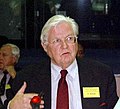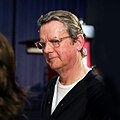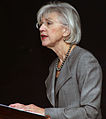University of British Columbia
The University of British Columbia (UBC) is a public research university with campuses near Vancouver and Okanagan in British Columbia, Canada. Established in 1908, it is the oldest university in British Columbia. With an annual research budget of $773 million, UBC funds over 10,000 projects a year.[4]
"UBC" redirects here. For other uses, see UBC (disambiguation).Motto
"It is up to you"
"It is yours"
1908
CA$2.8 billion (2023)[2]
CA$3.4 billion (2023)[3]
Gage Averill (Vancouver) and Rehan Sadiq (Okanagan)
5,696 (Vancouver)
600 (Okanagan)[4]
10,647 (Vancouver)
835 (Okanagan)[4]
66,266[5]
9,981 (Vancouver)
945 (Okanagan)[5]
- UBC Point Grey
- UBC Robson Square
- UBC–VGH Medical Campus
- UBC–BC Children's Hospital Research Institute
- UBC–Great Northern Way
Kelowna, British Columbia, Canada
- UBC Okanagan
- UBC Innovation Library
- UBC-KGH Clinical Academic Campus
Vancouver: 4.020 km2 (993 acres)
Okanagan: 2.086 km2 (515 acres)
English
The Ubyssey (Vancouver) The Phoenix News (Okanagan)
Blue and gold[7]
Thunderbirds (Vancouver)
Heat (Okanagan)
The Vancouver campus is situated adjacent to the University Endowment Lands located 10 km (6 mi) west of downtown Vancouver.[8] UBC is home to TRIUMF, Canada's national laboratory for particle and nuclear physics, which boasts the world's largest cyclotron. In addition to the Peter Wall Institute for Advanced Studies and the Stewart Blusson Quantum Matter Institute. UBC and the Max Planck Society collectively established the first Max Planck Institute in North America, specializing in quantum materials.[9] One of the largest research libraries in Canada, the UBC Library system has over 10 million volumes among its 21 branches.[10][11] The Okanagan campus, acquired in 2005, is located in Kelowna, British Columbia.
Eight Nobel laureates, 75 Rhodes scholars, 65 Olympic medals won, ten fellows in both American Academy of Arts & Sciences and the Royal Society and 273 fellows to the Royal Society of Canada, and 22 3M National Teaching Fellows have been affiliated with UBC.[12] Three Canadian prime ministers have been educated at UBC: John Turner, Kim Campbell (first female prime minister), and Justin Trudeau (current prime minister) .[13]
University rankings
44 (2023)
34 (2024)
40 (2023)
36
36
35 (2023)
2
3
2
2
3
3
Student life[edit]
Student representation[edit]
The Alma Mater Society of the University of British Columbia, or AMS, represents UBC undergraduate students within the Vancouver campus. The society's mandate is to improve the quality of educational, social and personal lives of UBC students. The AMS lobbies the UBC administration on behalf of the student body, provides services such as the AMS/GSS Health and Dental Plan, supports and administers student clubs and maintains the Student Union Building (aka SUB) and the services it houses. A constituency (undergraduate society) exists within each school and faculty of the university and acts as the subsidiary of the AMS within those schools and faculties.
The Graduate Student Society (GSS), which operates as an independent entity, represents graduate students. A council representing each graduate program and an executive elected by graduate students as a whole governs the GSS.[128]
The university also has elected student representatives sitting on, as voting members, the board of governors (three student representatives) and the academic senate (18 student representatives),[129] as laid out in the British Columbia University Act.[130] Although the university is the official body that elects the students, the university delegates these representative elections to the AMS.
On the Okanagan Campus, the Students' Union Okanagan, or UBCSUO, is the elected representation of the student body. Composed of a board of directors and executive team, the UBCSUO lobbies the administration and provincial government on behalf of the student body, manages the student health and dental plan, as well as hosts social programming throughout the year. The Student Union Offices are located within the University Centre Building. In the wake of the COVID-19 Pandemic, the SUO initiated the Emergency Bursary Program which supported UBC students with nearly $1,000,000 in emergency funding.[131]
Throughout UBC's history, faculty, alumni and former students have played prominent roles in many different fields. Many UBC alumni and faculty have gone on to win awards including eight Nobel Prizes and 74 Rhodes Scholarships.[8][189]
Former alumni have won Nobel Prizes: Robert Mundell (Economic Sciences) who graduated from the UBC Department of Economics and Bertram Brockhouse (Physics).[190][191] Five former faculty members of the UBC have also received a Nobel Prize: Michael Smith (Chemistry), Har Gobind Khorana (Physiology or Medicine), Daniel Kahneman (Economics), Hans G. Dehmelt (Physics) and Carl Wieman (Physics).[192][193][194][195]
Many former students have gained local and national prominence in government. Four Canadian prime ministers have attended UBC: Joe Clark, John Turner, Kim Campbell and Justin Trudeau.[196][197] Trudeau completed his BEd. at UBC in 1998,[198] and Clark briefly attended UBC law.[199] George Stanley, the Lieutenant Governor of New Brunswick and creator of the Canadian flag had also served as faculty.[200] Alumni Mike Harcourt, Glen Clark and Ujjal Dosanjh have been premiers of British Columbia:,[201][202][203] People of UBC Law have also served on the Supreme Court of Canada: former faculty member Beverley McLachlin and alumnus Frank Iacobucci.[204][205]
Other examples include:
UBC alumni have also held important positions in the academia. Notable examples are:










